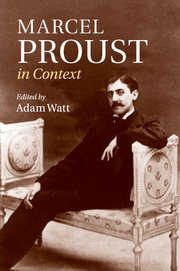Book contents
- Frontmatter
- Contents
- List of Illustrations
- Notes on contributors
- Figure I. Marcel Proust, portrait in oils by Jacques-Émile Blanche, 1892
- Preface
- Figure 2. Proust photographed on his death-bed by Man Ray, 1922
- Note on the text
- Chronology
- Part I Life and works
- Chapter 1 Life
- Chapter 2 Correspondence
- Chapter 3 Finding a form: Les Plaisirs et les jours to Contre Sainte-Beuve
- Chapter 4 Finding a voice: from Ruskin to the pastiches
- Chapter 5 Composition and publication of À la recherche du temps perdu
- Part II Historical and cultural contexts
- Part III Critical reception
- Further reading
- Index
- References
Chapter 3 - Finding a form: Les Plaisirs et les jours to Contre Sainte-Beuve
from Part I - Life and works
Published online by Cambridge University Press: 05 November 2013
- Frontmatter
- Contents
- List of Illustrations
- Notes on contributors
- Figure I. Marcel Proust, portrait in oils by Jacques-Émile Blanche, 1892
- Preface
- Figure 2. Proust photographed on his death-bed by Man Ray, 1922
- Note on the text
- Chronology
- Part I Life and works
- Chapter 1 Life
- Chapter 2 Correspondence
- Chapter 3 Finding a form: Les Plaisirs et les jours to Contre Sainte-Beuve
- Chapter 4 Finding a voice: from Ruskin to the pastiches
- Chapter 5 Composition and publication of À la recherche du temps perdu
- Part II Historical and cultural contexts
- Part III Critical reception
- Further reading
- Index
- References
Summary
It has long been acknowledged that during his ‘supposedly idle and unproductive years’, the young Proust was in fact extremely actively engaged in writing: journalism, the draft of a novel (later abandoned) and short fictions, translations, pastiches, critical essays . . . Varied in their themes (ranging from pure society events and fashion to aesthetic analyses of writers, painters and musicians) and forms (critical essays, pastiches) his articles are usually considered as preparatory stages of À la recherche du temps perdu. Genette considered them as ‘no more’ than ‘sketches’, ‘drafts’ of certain episodes, settings, themes or characters of the ‘definitive’ work. Indeed, the fascination that À la recherche exerts on its readers is so strong that one of the most interesting aspects of this period of Proust's life are the ways in which these ‘disorderly fragments’, as Jérôme Picon has put it, contribute to the ‘incubation of the novel’, to how the man turned himself into an artist. Thierry Laget goes as far as writing: ‘in their varied form, Marcel Proust's Essais et articles are no more than one single day of reading, a day of reading that lasts over half a century and which imperceptibly transforms itself into a day of writing’. ‘Imperceptible’ though it may be, it is clear that the novel did not emerge out of nowhere but can be viewed as the endpoint of a creative cycle chosen after a number of different approaches and processes were tried out.
- Type
- Chapter
- Information
- Marcel Proust in Context , pp. 19 - 26Publisher: Cambridge University PressPrint publication year: 2013



